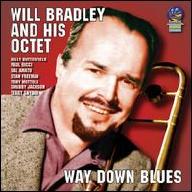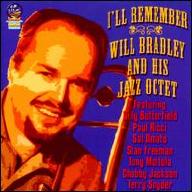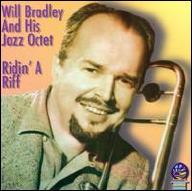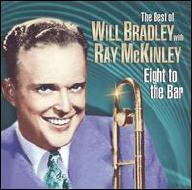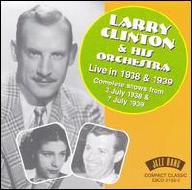Wilbur Schwichtenberg was born in Newton, NJ, on July 12, 1912, and raised a few miles away in the town of Washington. After moving to New York in 1928 he performed with dance bands such as Milt Shaw's Detroiters and Red Nichols His Five Pennies. From 1931-1934 he also worked at the CBS studios, played in the Ray Noble orchestra from 1935-1936, and then went back to steady work but relative anonymity as a studio instrumentalist until forming a big band in 1939 at the urging of booking agent Willard Alexander, who seems to have thought he could offset Schwichtenberg's persona by setting him up as co-leader with Texas-born swing drummer and wise guy McKinley, who installed Davey Tough as his own replacement with Jimmy Dorsey in order to link up with Bradley.
McKinley, whose talents included singing snappy lyrics from behind the hi-hat snare and tom-toms, felt that designating himself as leader would make hotel managers squeamish as they envisioned paying patrons unable to relax and keep the waiters busy. Better to have the handsome, well-dressed trombonist fronting the orchestra, and in order to facilitate that development his name was boiled down to Will Bradley. The band included pianist Freddie Slack (one of McKinley's bandmates from Jimmy Dorsey days, later to be replaced by Billy Maxted); tenor saxophonists Nick Caiazza, Arthur Rollini, John Van Eps, and Peanuts Hucko (famous later in life for his marvelous clarinet work); and trumpeters Lee Castle and Pete Candoli.
Vocals were by Carlotta Dale, Phyllis Myles, Lynn Gardner, Terry Allen, Larry Southern, Jimmy Valentine, guitarist Steve Jordan, or Ray McKinley, who excelled at catchy numbers like Old Doc Yak, Call Me a Taxi, Scramble Two, Let's Have Another One, I Get a Kick Outa Corn, Down the Road a Piece, the aforementioned monster hit Beat Me Daddy and further spinoffs like Rhumboogie, Rock-A-Bye the Boogie, and Booglie Wooglie Piggie, after which many might have preferred the attractive instrumental Celery Stalks at Midnight. The band (whose theme song was Strange Cargo) swung proficiently and used a Fletcher Henderson arrangement of Flyin' Home in 1940 with satisfying results.
Unfortunately, the gap between what Bradley and McKinley wanted was widening, and in 1942 the drummer left to form his own band. Bradley completely reorganized his orchestra and hired in a couple of neophytes -- trumpeter Shorty Rogers and a percussionist by the name of Shelly Manne. Then one day when they were performing in Detroit the draft board nailed six bandmembers at once, mostly brass players. Bradley canceled the rest of his tour and threw in the towel. As the years passed he liked to take out the trombone and play familiar melodies for the people, but much of his time was spent composing symphonies and chamber works, cutting gem stones, and becoming a silversmith, all pastimes well suited to his personality and temperament. Will Bradley passed away in Flemington, NJ, on July 15, 1989. His son Bill Bradley, Jr. was a bop drummer who worked with guitarist Johnny Smith, pianist George Wallington, clarinetist Tony Scott, and trombonist Kai Winding. He recorded with Woody Herman in 1956. ~ arwulf arwulf, Rovi


